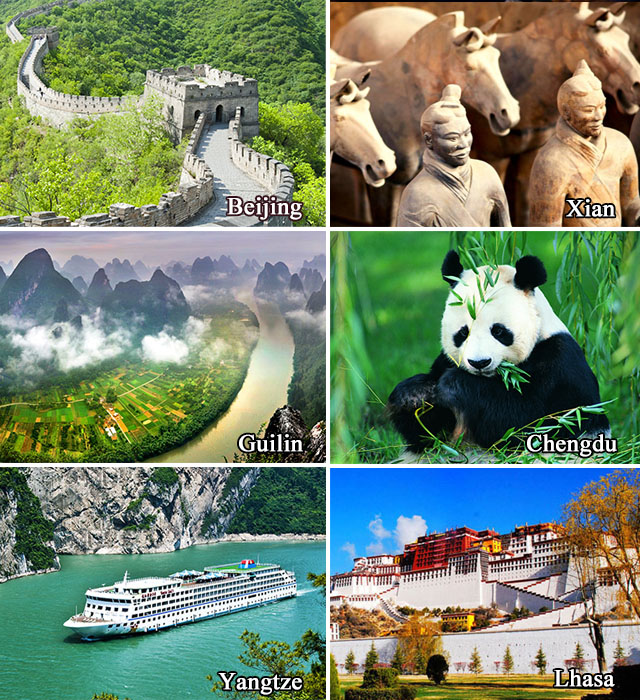20 Top Facts For Choosing China Tour Sites
20 Top Facts For Choosing China Tour Sites
Blog Article
Top 10 Tips On Street Food Safety In China
1. Choose Busy VendorsTip: Opt for vendors that have lengthy lines and a high turnover, as fresh ingredients are more likely to be used.
Pro A high turnover rate indicates freshness and a cult following with locals.
Cons: Waiting at the checkout can be time consuming.
2. Observe Hygiene Practices
Check for vendors wearing gloves who clean their workstations and don't handle food with bare fingers.
Pro: Reduces the risk of contracting foodborne illnesses.
Cons: The high standards for hygiene could limit your choices.
3. Avoid Uncooked Foods
Avoid eating raw food like raw fruits and meats, vegetables, eggs that are raw.
Pros: Cooked food is less likely to cause food poisoning.
Cons: Your choices are limited as you could be tempted by raw foods like sashimi.
4. Inspect Ingredients
TIP: Pay attention to the appearance and smell of the food. Fresh food must have a bright appearance and no unpleasant smell.
Pro: Helps you avoid spoiled or inferior quality ingredients.
Con: It could be difficult to detect the freshness of food, if one does not have experience.
5. Drink Boiled or Bottled Beverages
Tips: Use canning drinks, bottled water or tea that is made from boiling water to stay away from dangerous tap water.
Pro: Protects you from waterborne illnesses.
Con: Your options are limited, especially when you are a patron of street stalls.
6. Start Small
Tips: Begin by eating small amounts of a food you've never tried before to see how you feel.
Reduces the risk of having serious digestive problems.
Con: Food that's tasty and safe might not completely satisfy your desire.
7. Beware of ice in drinks
Ice cubes could contain untreated tap water.
Pro: Guards against contaminated water.
Con: Can make your drinks less refreshing, especially in hot weather.
8. Buy freshly prepared food
Tip: Pick food that's already prepared for you.
Pro: Lowers the risk of contamination following long exposure.
Con: Some prepared street food items can be difficult to resist or resist.
9. Hand Sanitizers to carry
Use wet or dry towels, or hand sanitizer, before eating if you don't have the facility to wash your hands.
Pro: This product lowers the chance of germs being transferred from your hands to your food items.
Cons: Makes you carry extra items, which could be a hassle.
10. Put your faith in your intuitions
Tips: If something appears or smells off Don't eat it no matter how tempting it may appear.
Pro: Can help you to avoid eating foods that make you sick.
Cons: Over-caution can lead to not having the authentic experience.
Street Food in China: Pros and Cons
Food that is cheap and tasty Street food is affordable and comes with a huge variety of flavors.
It's convenient: There are food and drink vendors all over the place. It's simple to grab an instant meal or snack.
Cultural Experience: Dining at street stalls immerses you in local cuisine culture and traditions.
The key is variety: Choose among Jianbing crepes (savory) or Chuan'r (grilled sticks).
Pros and Cons of Eating Street Food in China
Health Concerns: Foodborne illnesses could be a risk, especially in less reputable establishments.
Allergic reactions: Certain ingredients may not be disclosed. This can be an issue for those who have allergies.
Language Barriers can make it difficult to share ingredients or cooking methods.
Food Temptation : The sheer variety of choices can result in an overeating, which can cause stomach discomfort.
If you follow these tips for safety, you can confidently take advantage of China's lively street food culture and minimize health risks. See the recommended plan your journey to this landmark for website tips including eating in fuzhou, chinaexpeditiontours.comattractions, blue dragon temple, eating in guiyang, eating in taiyuan, shopping in tibet, ganden temple, the song of everlasting sorrow the famous long narrative poem, china built the worlds deepest high speed railway station under the great wall, honey lake country club and more.
Top 10 Tips On Respect For The Culture When Visiting Famous Temples In China
1. Tips: Every Temple has its own rules, rituals and the proper manner of conducting business. Always follow the local customs, be it bowing, offering incense, or simply observing silence during rituals.
Pro: Shows an admirable respect for the temple and its sacred practices.
Cons: Temple practices and etiquette may be confusing if unfamiliar with them.
2. Dress modestly
Cover your the shoulders, arms and thighs. Some temples will provide scarves, shawls, or other covers for visitors.
Pro: Shows respect for the sacred space, and does not offend locals.
Con: In hot weather it may be uncomfortable and require additional clothing.
3. Calm down and be quiet
Tip: Maintain a peaceful and quiet demeanor. This is especially important in prayer rooms and sacred spaces. Be quiet and refrain from loud conversations.
Pro: Maintains the sanctity of the area and shows respect for worshippers.
Con: Silence could feel awkward or unnatural at crowds of tourists.
4. Avoid Disrupting Worshippers
Tip: Do not interrupt people who are praying or meditating. Allow them time and space to finish their rituals.
Pro Respects other people's spiritual practices.
Con: While you might be tempted to, keep away from the worshipers who are distracting.
5. Do not touch sacred objects.
TIP: Don't touch altars, statues or other sacred items, except when specifically permitted. They are thought to be sacred.
Pro: Respects traditional practices and safeguards the holy.
Pros: You might be tempted to touch the items in order to snap photos or because of curiosity.
6. Don't Disrespect the Elders
Tips: In the majority of temples, elders are respected. If you interact with them, make sure to be courteous and respectful.
Pro: Honors culture's value of respecting the elders.
Cons: It may be difficult to understand if it's not your first language.
7. Get the direction of the locals.
Tip: If there's a doubt about the correct manner of conduct, observe how locals are behaving and follow their example, whether it's what to do with offerings or what to do.
You can blend into the crowd if you follow proper procedures.
Con: It could take some time for you to observe in order to comprehend what's happening.
8. You must be granted permission to take photos.
Always ask for permission before taking photos, particularly if you are in a place where people may be praying or photography is restricted. Some temples may prohibit photography entirely.
Pros: Respects the privacy of people and reverence for the sacredness of the area.
Con: Can lead to missed opportunities for photos, especially when in stunning locations.
9. Respect and be humble in your offerings
Don't be extravagant in your offering. Avoid giving extravagant gifts unless needed for a special occasion.
Pro: Aligns the local customs.
Cons: You may not feel confident about what you are supposed to be delivering without local assistance.
10. Be aware of your behavior and your Language
Keep a composed and respectful behavior at all times. Avoid inappropriate language or jokes in sacred areas.
Pro: Creates an environment that is peaceful and respectful for all visitors and worshippers.
Con: Although a laidback or humorous attitude may be intuitive, maintaining your balance and poise is crucial.
Chinese temples: a place that is a symbol of respect for culture
You can build positive connections by demonstrating respect to the people of the culture.
Shows a desire for an understanding of culture and a deeper immersion into Chinese customs.
The interaction with the temple's culture creates an unforgettable experience that is enriching and memorable.
Avoiding Mistakes : Adhering to the customs of your culture will allow you to avoid offending sacred sites or people. This will ensure a more enjoyable visit.
Increased Spiritual sensitivity. Recognizing the spiritual and cultural practices in a region can aid in understanding of their practices.
Cons of Cultural Respect in Chinese Temples
Cultural Misunderstanding: Without prior experience, you might be prone to mistakes or confusion about how to dress in a temple, which can cause discomfort.
Physical Discomfort Dressing modestly in hot weather and adhering religious rituals can lead to temporary discomfort.
In the absence of strict rules, you may feel restricted in how you can experience the temple (e.g., no photography, or speaking).
It is time-consuming: Attending temple ceremonies and learning customs may require more time. Your overall sightseeing schedule may be affected.
Language Barriers: Understanding particular rituals and asking for permission could be a challenge if there is an obstacle in the language.
It is not just about having the most satisfying and fulfilling experience in China's temples if you follow these suggestions as well, but you'll help to preserve the traditions and sanctity of these sacred places. View the top rated find travel ideas for this location for blog advice including binhai aircraft copyright theme park in tianjin, wuxi a shining pearl of taihu lake, ancient dapeng fortress, zhangjiajie tour maps, shopping in nanjing, eating in fuzhou, shanghai portman acrobatic show one of the best acrobatic shows in shanghai, taishan, ancient football in china cuju in ancient china, hohhot transportation and more.